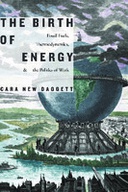Explore

In The Birth of Energy Cara New Daggett traces the genealogy of contemporary notions of energy back to the nineteenth-century science of thermodynamics to challenge the underlying logic that informs today's uses of energy. These early resource-based concepts of power first emerged during the Industrial Revolution and were tightly bound to Western capitalist domination and the politics of industrialized work. As Daggett shows, thermodynamics was deployed as an imperial science to govern fossil fuel use, labor, and colonial expansion, in part through a hierarchical ordering of humans and nonhumans. By systematically excavating the historical connection between energy and work, Daggett argues that only by transforming the politics of work—most notably, the veneration of waged work—will we be able to confront the Anthropocene's energy problem. Substituting one source of energy for another will not ensure a habitable planet; rather, the concepts of energy and work themselves must be decoupled.
This book is included in DOAB.
Why read this book? Have your say.
You must be logged in to comment.
Rights Information
Are you the author or publisher of this work? If so, you can claim it as yours by registering as an Unglue.it rights holder.Downloads
This work has been downloaded 306 times via unglue.it ebook links.
- 203 - pdf (CC BY-NC-ND) at OAPEN Library.
Keywords
- Economic aspects
- Energiepolitik
- Energy consumption
- Energy industries
- Energy policy
- Environmental aspects
- Environmental Conservation & Protection
- History
- Imperialismus
- Nature
- Political aspects
- Political Science
- Political Science & Theory
- Politics & government
- Politische Wissenschaft
- Power resources
- Public Policy/Environmental Policy
- Rassismus
- Society & Social Sciences
- Technischer Fortschritt
- The environment
- thema EDItEUR::J Society and Social Sciences::JP Politics and government::JPA Political science and theory
- Thermodynamik
Links
DOI: 10.1215/9781478090007Editions


